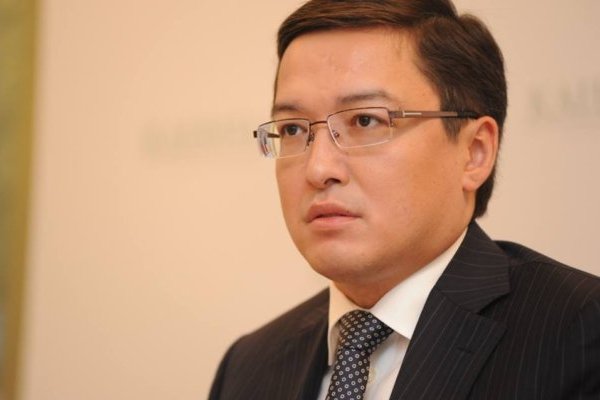Chairperson of the National bank of Kazakhstan Daniyar AKISHEV:
BANKING SECTOR SUPPORT PROGRAM TO BE IMPLEMENTED IN 2017

The National Bank of Kazakhstan plans to carry out a banking sector rehabilitation program by the end of the current year. The National Bank Chairperson Daniyar AKISHEV told Interfax-Kazakhstan in an interview about the measures that will be taken this year to address the problems in the banking sector of Kazakhstan.
- When does the National Bank plan to implement the bank support program? What banks will be eligible for this program?
- The National Bank has already developed a banking sector rehabilitation program, in accordance with which the government will provide support for the backbone banks of the country. Joint participation in the program of the Kazakh government, in the person of the National bank, and the stakeholders of the banks will be an essential prerequisite for the government’s support for the banks. In other words, the National Bank will provide from its own funds long-term loans to the banks on condition that the shareholders of these banks also inject funds in the capital. The program also aims to reinforce the regulatory and control functions of the National Bank over the banking sector of the country.
This program is to be implemented in 2017.
- How does the National bank plan to clean up toxic assets at the second-tier banks?
- In accordance with the rehabilitation program, each bank needs to develop a two-year recapitalization plan that has to be approved by the National Bank. This plan should also provide for capital injections by the bank shareholders. The scope of the government’s support will be specified for each bank individually depending on possible losses and the shareholders’ capability to increase the capital of the bank. This is the first objective of the rehabilitation program.
Its second objective is to strengthen the regulatory and control functions of the National Bank, which will now include risk-based supervision. The National Bank will toughen requirements for the quality of bank assets, for transactions with related parties and for loan guarantees, will introduce a harmonized approach to provisions assessment and will also strengthen requirements for operations of audit and appraisal companies in the financial market.
- The banking sector is now moving towards consolidation. We have already seen mergers and others are under discussion. Do you think the number of second tier banks should decrease?
- The number of banks in the banking sector depends on the current economic situation which is influenced by internal and external factors. The banking industry is the circulatory system of the economy and it serves to redistribute financial resources between the business entities. Therefore, the number of banks in the market is determined by such key factors as inflation, GDP per capita, the relative size of the banking sector, the area of the country, the size of its population and so on.
- The IMF mission said in its Staff Concluding Statement of 2017 that Kazakhstan should avoid mergers involving weak institutions. Will the National Bank follow this recommendation? And how will the National Bank assess the financial condition of the second tier banks in view of this recommendation?
- The National Bank works in a constructive manner with all international organizations, including the IMF. We meet with IMF experts on a regular basis to discuss recent developments in the financial market and to explain our decisions to them. As far as mergers are concerned, such decisions can only be made by the shareholders of the banks that wish to stay in the banking industry despite new macroeconomic factors and challenges. On the other hand, no merger should be detrimental to the interests of the clients and creditors of the banks.
- Halyk Bank CEO Umut Shayakhmetova said earlier that the deal between Halyk Bank and Kazkommertsbank could be in the form of joining or purchase rather than merger. What form of consolidation would be most beneficial to the clients and shareholders from the viewpoint of the National Bank?
- It is up to Halyk Bank to decide on the form of consolidation, either joining, merger or purchase. The National Bank’s concern is that the interests of all clients and creditors of the banks should be well protected and the new shareholders should have sufficient financial resources to support sustainable development of the banks.
- The IMF mission said in its Statement that the Centralized Accumulative Pension Fund (CAPF) should not place deposits in weak banks and should keep its focus on ensuring strong and sound investment returns, rather than supporting monetary or fiscal policy initiatives. Do you think the CAPF’s policies will be revised in view of this recommendation?
- In 2016, all investments involving the pension assets were in accordance with the guidelines approved by the National Fund Management Council and following the government’s decision dated February 10, 2016 about placement of 200 billion tenge through the second tier banks to finance SMEs.
The pension funds were deposited into saving accounts of the banks for 42 months at 14% to 16.5% per annum. The banks will use these funds to finance small- and medium-sized businesses and the real sector of the Kazakh economy. So, the pension assets of the CAPF are not deposited with the banks as part of the monetary and fiscal policy.
- If this year’s inflation target of 6-8% is reached, will the National Bank lower the base rate?
- At the end of March 2017 the inflation level stood at 7.7%, which is within the targeted corridor of 6-8%. On April 10, 2017 we made the decision to keep the base rate at 11% as the business activities have been growing and the financial market has been stable. At the same time, the inflation remains very sensitive to such factors as changes in the international markets, the increase in budgeted expenditures in 2017 and the growth of individual incomes, which may drive the inflation higher in the future.
If the fiscal situation does not change, the National Bank expects the inflation to remain within the set corridor in 2017-2018, which may allow us to ease the monetary policy as early as the 4th quarter of the current year.
- Thank you for your time!
May, 2017
© 2025 Interfax-Kazakhstan news agency
Copying and use of these materials without reference to the source is prohibited
Archive





